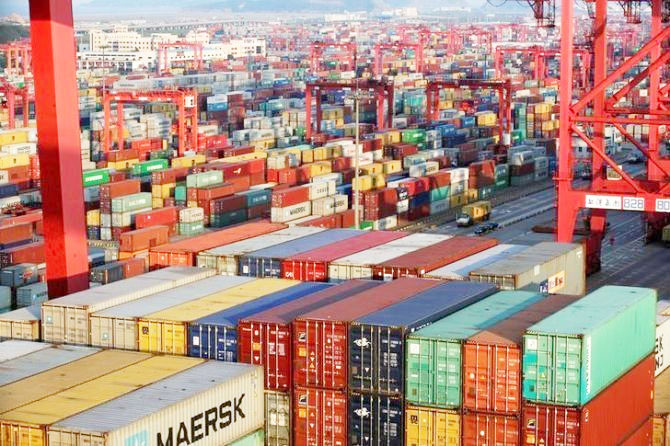New Delhi, Apr 15
India’s merchandise exports dipped marginally in March to USD 41.69 billion, and by 3.11 per cent during the last fiscal year to USD 437.06 billion mainly due to continued geopolitical turmoil, and depressed global trade.
Imports, too, declined in March as well during the entire 2023-24. Trade deficit, or the gap between imports and exports, narrowed 17.74 per cent in March to USD 15.6 billion and came down 9.33 per cent to USD 240.17 billion in FY24.
Gold imports, which surged 30 per cent during the fiscal year to USD 45.54 billion, was one of the major contributors to trade deficit.
Replying to a query on escalation of the crisis in the Middle East, Commerce Secretary Sunil Barthwal, who was briefing about the trade data, said the ministry was monitoring the situation and will take “appropriate action”. However, he did not elaborate due to the Model Code of Conduct in place ahead of the Lok Sabha elections.
The Secretary, however, added that diversification of India’s exports helps in mitigating impact of regional conflicts. The overall exports (merchandise + services) are estimated to surpass last year’s highest record, the Secretary said.
It is estimated to reach USD 776.68 billion in 2023-24 as compared to USD 776.40 billion in 2022-23.
Barthwal said March witnessed the highest monthly merchandise exports during 2023-24 at USD 41.68 billion.
Main drivers of merchandise export growth in 2023-24 include electronic goods, drugs and pharmaceuticals, engineeringg oods, iron ore, cotton yarn/fabs/made-ups, handloom products and ceramic products and glassware. Electronic goods exports increased 23.64 per cent from USD 23.55 billion in 2022-23 to USD 29.12 billion in 2023-24.
Drugs and pharmaceuticals exports increased 9.67 per cent from USD 25.39 billion in 2022-23 to USD 27.85 billion during the fiscal year.
Data showed that engineering goods exports increased 2.13 per cent to USD 109.32 billion in 2023-24.
The commerce ministry also said the overall trade deficit is estimated to significantly improve 35.77 per cent from USD 121.62 billion in 2022-23 to USD 78.12 billion in 2023-24.
President of Federation of Indian Export Organisations (FIEO) Ashwani Kumar said the recent tensions in West Asia, especially the threat for consignments routing through the Red Sea has further added to woes of the exporting community, as the freight rates, along with the insurance cost, have gone up unimaginably high, with the burden of various surcharge.
He also raised concern that much will depend on the new contracts to be signed with buyers during the new fiscal as the exporters have been absorbing the burden of increased freight cost as per the old agreement.
The FIEO President reiterated that the need of the hour is to address the Middle East geopolitical situation, Red Sea crisis challenges by ensuring availability of marine insurance and rationale increase in freight charges.
Meanwhile, on the much-awaited India-UK FTA, the commerce ministry said the 14th round of negotiations was completed in January.
Recently, a UK team visited India (March 5-7) for negotiations on pending issues. Teams have made good progress, it said, adding that majority of difficult issues are towards resolution. A couple of key priority issues to seal the deal are being ironed out to have a balanced outcome. A team of negotiators from India is in the UK for talks, the ministry said.
On India-EU FTA, the ministry said 7th round of negotiations were completed in February 2024.
Both sides have agreed to meet between sessions virtually on many chapters, before commencement of the 8th Round that is being planned in May/June in Brussels, it added.
According to commerce ministry data, the estimated value of services exports for March 2024 is USD 28.54 billion, as compared to USD 30.44 billion in the year-ago month.
Services imports are estimated at USD 15.84 billion in March, as compared to USD 16.96 billion in March 2023.
Trade surplus in services for FY24 is estimated at USD 162.05 billion, up from USD 143.28 billion in the preceding fiscal year.
Ajay Sahai, Director General and CEO of FIEO, said because of the Red Sea issue, several shipments were delayed and have spilled over in April.
“So, export data of March should be seen in that perspective also,” he said.


























